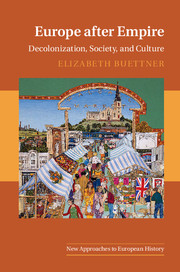Book contents
- Frontmatter
- Contents
- List of figures
- Acknowledgements
- Introduction
- Part I Decolonization for colonizers: Europe's transition to the postcolonial era
- 1 Myths of continuity and European exceptionalism: Britain, decolonization, and the Commonwealth family ideal
- 2 Occupation, resistance, and liberation: the road to Dutch decolonization
- 3 Soldiering on in the shadow of war: decolonizing la plus grande France
- 4 Long live the king? Belgium, the monarchy, and the Congo between the Second World War and the decolonization years
- 5 From rose-coloured map to Carnation Revolution: Portugal's overseas amputations
- Part II Migrations and multiculturalisms in postcolonial Europe
- Part III Memories, legacies, and further directions
- Epilogue: thoughts towards new histories of contemporary Europe
- Bibliography
- Index
5 - From rose-coloured map to Carnation Revolution: Portugal's overseas amputations
from Part I - Decolonization for colonizers: Europe's transition to the postcolonial era
Published online by Cambridge University Press: 05 June 2016
- Frontmatter
- Contents
- List of figures
- Acknowledgements
- Introduction
- Part I Decolonization for colonizers: Europe's transition to the postcolonial era
- 1 Myths of continuity and European exceptionalism: Britain, decolonization, and the Commonwealth family ideal
- 2 Occupation, resistance, and liberation: the road to Dutch decolonization
- 3 Soldiering on in the shadow of war: decolonizing la plus grande France
- 4 Long live the king? Belgium, the monarchy, and the Congo between the Second World War and the decolonization years
- 5 From rose-coloured map to Carnation Revolution: Portugal's overseas amputations
- Part II Migrations and multiculturalisms in postcolonial Europe
- Part III Memories, legacies, and further directions
- Epilogue: thoughts towards new histories of contemporary Europe
- Bibliography
- Index
Summary
‘Portugal não é um país pequeno’ – ‘Portugal is not a small country’, read a poster advertising the 1934 Colonial Exhibition held in the city of Porto. This slogan accompanied a map of Europe upon which Angola, Mozambique, and other faraway Portuguese-ruled territories had been lifted out of Africa and Asia, placed side by side, and repositioned as a geographical extension of Portugal itself, superimposed so that they fanned out to cover much of Spain, France, Germany, and Eastern Europe, even extending into Russia. While literally distant and discontinuous, figuratively the colonies were amalgamated and moved towards home to transform Portugal – in reality dwarfed by larger, wealthier, and more politically powerful neighbours – into a European giant. Never mind that Portugal was just one of a number of European nations with an overseas empire: colonies were a source of national pride and aggrandisement, creating an impressive rose-coloured map and an affirmative story Portugal could tell itself, and others, as evidence of an importance that greatly exceeded limited European territorial confines and capabilities.
Not coincidentally, Portugal's insistent colonial propaganda of the 1930s came at a critical historic juncture as the Estado Novo, or ‘New State’, consolidated itself after a military coup in 1926 had ended a republic and ushered in nearly fifty years of dictatorship, mainly under the rule of António de Oliveira Salazar. This half century started with European overseas empires at their peak but gradually witnessed the intensification of international pressures that led to a protracted decolonization process after 1945. During that period, Portugal's experience attested to imperialism's fundamental impact not only on colonized peoples but also within Europe's colonizing nations themselves. In Portugal's case, the importance of overseas engagement to national identity dated back nearly five hundred years to the time when Prince Henry the Navigator and explorers like Vasco da Gama launched the era of the ‘Discoveries’ that made Portugal the pioneering maritime power it became in the early modern era. Assertions of the longevity of its history outside Europe were far more than mere statements of historical fact in the twentieth century: rather, they were politically-motivated pronouncements predicated upon at least as much myth as reality. Defending its global heritage and right to remain overseas was a crucial dimension of Portugal's national identity and culture, particularly in the face of growing challenges that both stemmed from and followed the Second World War.
- Type
- Chapter
- Information
- Europe after EmpireDecolonization, Society, and Culture, pp. 190 - 210Publisher: Cambridge University PressPrint publication year: 2016



